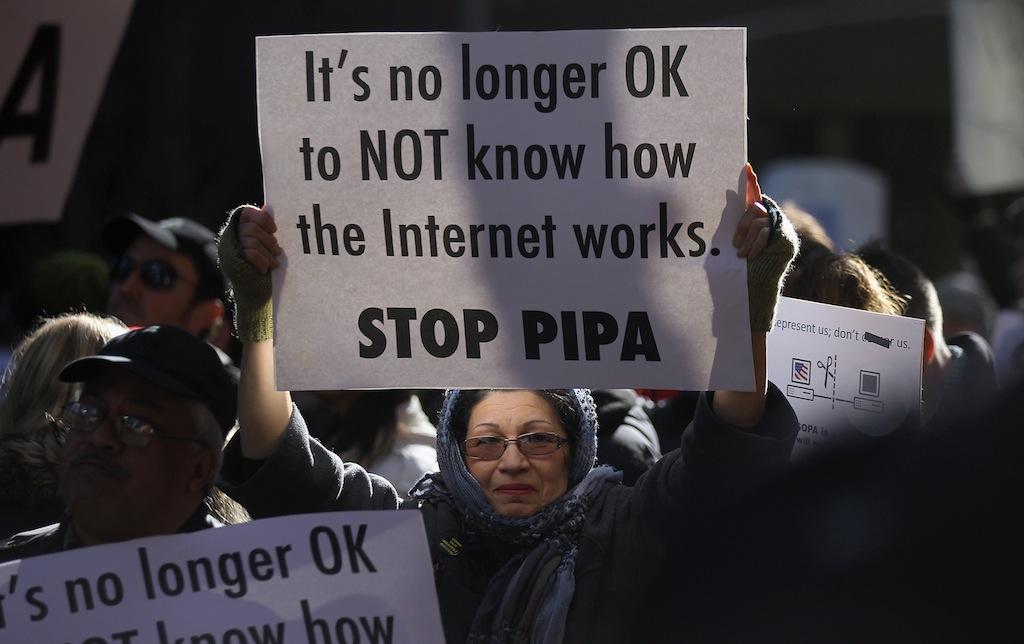Aaron Swartz suicide spurs friends, allies to fight on a year later
Protesters demonstrate against the proposed Stop Online Piracy Act (SOPA) and Protect IP Act (PIPA) outside the offices of U.S. Sen. Charles Schumer (D-NY) and U.S. Sen. Kirsten Gillibrand (D-NY) on Jan. 18, 2012 in New York City.
A year after Aaron Swartz — hacker, activist, SOPA killer, RSS and Reddit co-creator … a true child of the internet — committed suicide while facing a maximum of 35 years in jail, his friends and allies fight on in his name.
On Saturday, Harvard Law School Professor Lawrence Lessig took to the streets, walking his way to New Hampshire, as he put it, to "launch a campaign to bring about an end to the system of corruption that we believe infects DC."
He was talking about how political campaigns are financed. He's calling it the "New Hampshire Rebellion," (#NHRWalk), and he wrote in an article for the Atlantic that is was Swartz who had convinced him to take on this issue years ago.
"Ninety-six percent of America believe it is 'important' 'that the influence of money in politics be reduced' — 68 percent believing it 'very important,' 28 percent just 'important,'" Lessig wrote. "Yet 91 percent of America believes it is 'not likely' that the influence will be reduced," he added.
And then there's the Electronic Frontier Foundation, a nonprofit dedicated to a free and open internet and active on issues of free speech and privacy. They posted a memorial article to Swartz on Saturday.
"One year ago, we lost Aaron Swartz, a dear friend and a leader in the fight for a free and open Internet," Parker Higgens of EFF wrote. "It's a testament to the power of his commitments and ideals that both in life and in death he has inspired millions around the world, including all of us at EFF, to redouble our own efforts to advance the causes that he believed in, and to untangle the twisted and brutal computer crime laws that were used to persecute him."
Higgens is talking about the Computer Fraud and Abuse Act (CFAA), the law used against Swartz after he downloaded a massive amount of files from an academic database while on MIT's network.
After Swartz hung himself, many sought to limit the range of CFAA, calling for "Aaron's law." But as the Washington Post notes, while advocacy groups had supported lawmakers in their efforts, Aaron's Law "went nowhere."
That hasn't stopped the EFF from trying, though.
And now Swartz's name is attached to another event – the "Day We Fight Back." The day, set for Feb. 11, 2014, is against what the event's website calls a threat to the internet and "the notion that any of us lives in a genuinely free society: mass surveillance."
"If Aaron were alive," the website states, "he'd be on the front lines, fighting against a world in which governments observe, collect, and analyze our every digital action."
So it seems that many of Swartz's friends and allies are carrying the torch as they see fit. And the internet, in its way, is marking Swartz's death and celebrating his life. Here's one of the best photos making the rounds on social media:
#RarePhoto Prof Lawrence Lessig with then-14-year-old prodigy Aaron Swartz #RestInPeaceAaronSwartz #ManWithIntegrity pic.twitter.com/iJxvky75J3
And here's a clip from the “The Internet’s Own Boy," an upcoming documentary on Swartz, with testimony from those who knew him.
Our coverage reaches millions each week, but only a small fraction of listeners contribute to sustain our program. We still need 224 more people to donate $100 or $10/monthly to unlock our $67,000 match. Will you help us get there today?
